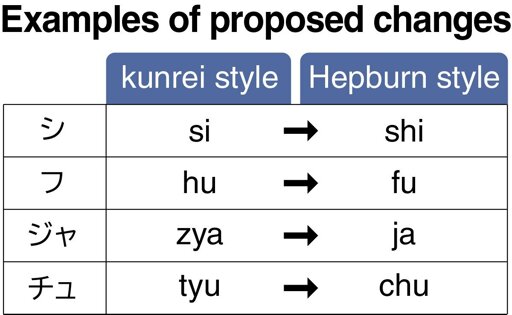The Cultural Affairs Agency has finalized a draft proposal to adopt the Hepburn style as the unified standard of romaji, or romanized Japanese, primarily due its closer resemblance to English pronunciation.
[……]
Currently, schools [in Japan] primarily teach the kunrei style in accordance with the existing Cabinet announcement. However, the Hepburn style is widely used in society.
Might there be efforts to address some of the issues surrounding the Hepburn romanization when it comes information loss especially when there’s a kana → romanization → kana roundtrip?
For example:
- ジ ⇒ ji
- ヂ ⇒ ji
- ji ⇒ ジ (?)
As far as the one Youtube video (in Japanese) I watched that summarize the draft, there doesn’t seem to be.
The Agency also previously asked for public comments, and have just released the result here.
Thanks for the information.
I am not so much concerned as the usability of the Hepburn romanization as it’s survived the test of time, but if I am remembering it correctly, Kunrei-shiki was chosen because of this one-to-one lossless transcription between the Japanese kana and the transcription. Hence, I was wondering if this is still a concern, and whether or not there are steps to address this if ever this is still a concern.
Dajiro did a decent video on this (in Japanese) going over the changes. https://www.youtube.com/watch?v=uEYo0Sf9kAI
I’m mostly a fan of the changes since things like
syanever sound likeshain my mind andtidoesn’t look likechiAND conflicts withティHmm, does this mean if we tried to use the hepburn style to speak Japanese it would still be correct or is it only ‘correct’ in writing for this specific purpose?
This has nothing to do with speaking. This is just the government deciding which system to use (or at least favor) for transliterating things into English when writing (street signs for example). If you want to speak/learn Japanese, skip romaji altogether.
Okay, thanks!
using romaji as a guide to pronounce is problematic no matter what system. pronouncing strictly based on kana is not problem free either. Korean hangul romanization may be a more obvious example of the dissonance with pronunciation but Japanese also has it.
most effective is to rely primarily on listening.
having grown up in US, I can say that our English instruction for anglophone natives draws a false equivalence between pronunciation and orthography/spelling. this creates a counterproductive mindset for approaching new languages.
does this mean if we tried to use the hepburn style to speak Japanese it would still be correct
I very much doubt it, but that’s just my opinion so take it with a grain of salt the size of your choosing.



